Short & Sweet Treats discussion
Take a Coffee Break...
>
Word of the Day
 In ancient times, four temperaments were associated with the four "humours": phlegmatic, sanguine, melancholic, and choleric.
In ancient times, four temperaments were associated with the four "humours": phlegmatic, sanguine, melancholic, and choleric. I'll start with:
PHLEGMATIC (fleg MAT ik)
having or showing a slow and stolid temperament
The phlegmatic temperament is traditionally associated with water. People with this temperament may be inward and private, principled, reasonable, calm, patient, and tolerant. They tend to have a rich inner life, seek a quiet, peaceful atmosphere, and be content with themselves.
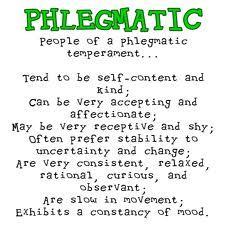
 How very excellent, Jen! I'll do "sanguine" next in your honor :-)
How very excellent, Jen! I'll do "sanguine" next in your honor :-)SANGUINE (SANG-gwin)
cheerful and confident; optimistic
The sanguine temperament is traditionally associated with air. People with this temperament tend to be playful, lively, sociable, carefree, talkative, and pleasure-seeking. They may be warm-hearted and optimistic.
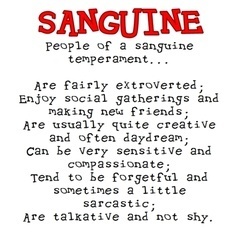
 crural
cruralPRONUNCIATION:
(KROOR-uhl)
MEANING:
adjective: Relating to the leg.
ETYMOLOGY:
From Latin crus (leg). Earliest documented use: 1599.
USAGE:
"She could tell by his occasional grimace that her massage of his crural muscle above the patella on his right knee still caused him discomfort."
Kenneth Johnson; V: The Second Generation; Tor; 2008.

 MELANCHOLIC
MELANCHOLIC great sadness, especially of a thoughtful or introspective nature
From Ancient Greek:
μελαγχολία (melankholia, “melancholy”).
The melancholic temperament is traditionally associated with the element of earth. People with this temperament may appear serious, thoughtful, introverted, and cautious or even suspicious. They can become preoccupied with the tragedy and cruelty in the world and are susceptible to depression and moodiness.

 CHOLORIC
CHOLORICirritable, easily angered
The choleric temperament is traditionally associated with fire. People with this temperament tend to be egocentric and extroverted. They may be excitable, impulsive, and restless, with reserves of aggression, energy, and/or passion, and try to instill that in others.
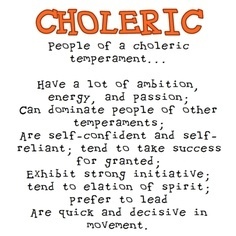
 Modern psychology has moved away from using these terms from the ancients and middle ages--but even then, people realized we have elements of all the "humours" in us :-) Here's a chart of some possible combinations:
Modern psychology has moved away from using these terms from the ancients and middle ages--but even then, people realized we have elements of all the "humours" in us :-) Here's a chart of some possible combinations: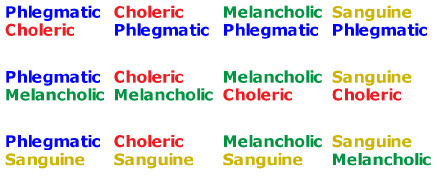
So I was having a "choloric" day when my computer glitched, but then the sun came out and I went to "sanguine" :-)
 So true, Jen--and it's interesting to see that these "temperaments" carry over into some of the modern psychological systems. I used the Keirsey Temperament Sorter with my students, who were fascinated. In fact, our whole teaching staff did this exercise :-)
So true, Jen--and it's interesting to see that these "temperaments" carry over into some of the modern psychological systems. I used the Keirsey Temperament Sorter with my students, who were fascinated. In fact, our whole teaching staff did this exercise :-) It's found at the end of Please Understand Me: Character and Temperament Types by David Keirsey. And you can take the test for free online at http://www.keirsey.com/sorter/registe...
I just took it and the free report has me as an "Idealist-Teacher", ENFJ. Keirsey based his work on the Myers-Briggs framework (which came from Jung).
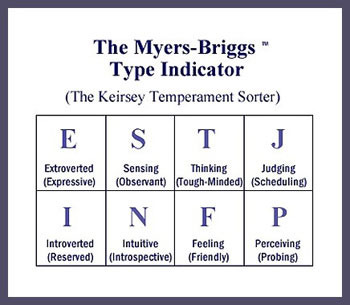

I just took of. it says I am "Guardian Protector." I have to find out wwhat that means. I didn't see a description.
 LaLaLa Laura wrote: "I just took of. it says I am "Guardian Protector." I have to find out wwhat that means. I didn't see a description."
LaLaLa Laura wrote: "I just took of. it says I am "Guardian Protector." I have to find out wwhat that means. I didn't see a description."I just googled "Guardian-Protector" and several places came up. This one is pretty good: http://web.calstatela.edu/faculty/jsh...
And this comment certainly fits you :-) "They also derive a great deal of satisfaction from caring for others, and they offer their comfort gently and helpfully."
 acedia
acediaPRONUNCIATION:
(uh-SEE-dee-uh)
MEANING:
noun: Apathy; boredom; sloth.
ETYMOLOGY:
From Latin acedia, from Greek akedia, from a- (not) + kedos (care). Earliest documented use: 1607.
USAGE:
"Acedia plagues the novice much more than the experienced solitary; unlike some of the new guards, I do not suffer from boredom or listlessness."
Chloe Aridjis; Asunder; Mariner Books; 2013.
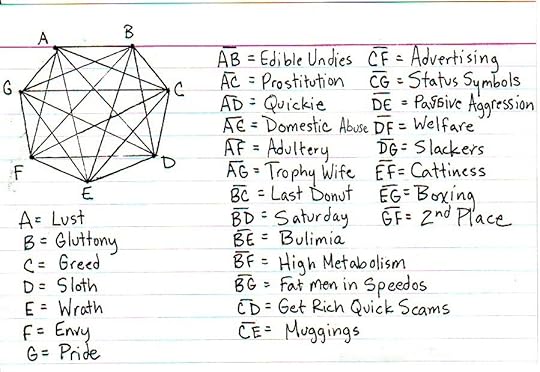
Acedia is one of the seven deadly sins in Christian theology. Others are pride, wrath, greed, lust, envy, and gluttony. What happens when you mix any two of these? Check out the above chart. Combining three or more sins is left as an exercise for the reader.
 KENNING
KENNINGA figurative, usually compound expression used in place of a name or noun, especially in Old English and Old Norse poetry; for example, "storm of swords" is a kenning for battle.
About a third of the words in Beowulf are words known as kennings. Kennings are words that are in themselves metaphorical descriptions, and were a typical feature of Anglo-Saxon poetry. Kennings combine two words to create an evocative and imaginative alternative word. By linking words in this way, the poets were able to experiment with the rhythm, sounds and imagery of the poetry. Beowulf contains over a thousand kennings.
Some well-known Anglo-Saxon kennings include:
bone-house (banhus ) - the human body
battle-light (beadoleoma) - sword
wave-floater (wægflota) - ship
Descriptions of the sea included:
whale-road (hronrad)
fish-home (fiscesethel)
seal-bath (seolbæp)
 Julia wrote: "So true, Jen--and it's interesting to see that these "temperaments" carry over into some of the modern psychological systems. I used the Keirsey Temperament Sorter with my students, who were fascin..."
Julia wrote: "So true, Jen--and it's interesting to see that these "temperaments" carry over into some of the modern psychological systems. I used the Keirsey Temperament Sorter with my students, who were fascin..."I'm ISFJ, a pretty common set I believe.
 decant
decantPRONUNCIATION:
(di-KANT)
MEANING:
verb tr.:
1. To pour, especially in a manner that the sediment is left behind.
2. To rehouse people while their buildings are being rebuilt or refurbished.
ETYMOLOGY:
From French décanter (to settle or to clarify), from Latin decanthare, from de- (from) + canthus (spout, rim). Earliest documented use: 1633.
USAGE:
"Once a customer makes a purchase, she decants the oil into dark glass bottles."
Chris Copley; New Tasting Gallery; The Herald-Mail (Hagerstown, Maryland); Oct 29, 2013.
"The council say decanting Muirfield pupils to the huts will speed up construction."
Graeme Bletcher; Arbroath Primary School Move Branded 'Insane'; The Courier (Dundee, Scotland); Nov 8, 2013.

 ORRERY
ORRERY(OR-uh-ree)
An orrery is a mechanical device that illustrates the relative positions and motions of the planets and moons in the solar system in a heliocentric model. They are typically driven by a clockwork mechanism with a globe representing the Sun at the centre, and with a planet at the end of each of the arms.
The first orrery was conceived by English clockmaker and inventor George Graham (c.1674-1751) around 300 years ago. This initial model only showed the earth-moon system which orbits our Sun. Graham gave the design of this original model to the celebrated London instrument maker John Rowley, who was commissioned to make one for his patron Charles Boyle (1674-1731). Boyle's patronage of Rowley soon led to the elaboration of Graham's invention so that it included all the known planets and some moons of the solar system. The origin of the term "orrery" is explained when we consider the title Boyle held - the fourth Earl of Orrery (Orrery being the old name for a part of Co. Cork).
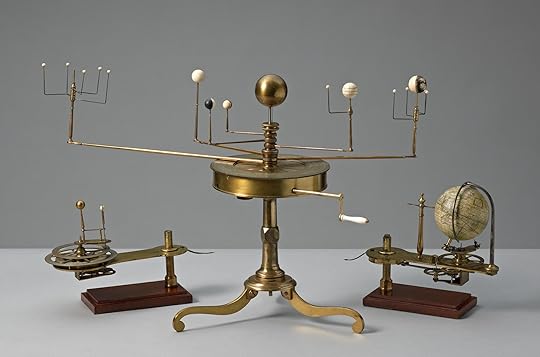
 Me, too! I've been looking for a small one for years, but they're quite expensive.
Me, too! I've been looking for a small one for years, but they're quite expensive. The picture above is of an orrery made by Benjamin Martin; it's actually for sale (100,000 to 150,000 pounds) at http://www.masterart.com/rare-Benjami...
It's nice to know that ones like this are available for children: http://www.amazon.com/Educational-Ins...

 quinary
quinaryPRONUNCIATION:
(KWY-nuh-ree)
MEANING:
adjective:
1. Relating to five.
2. Fifth in a series.
3. Having five things or arranged in five.
ETYMOLOGY:
From Latin quinarius (containing five), from quini (five each), from quinque (five). Earliest documented use: 1598. If you have ever wondered what comes after primary, secondary, tertiary, and quaternary, here's your answer.
USAGE:
"Her eyelids were painted in a quinary array -- pearl, gunmetal, pink, midnight blue, and plum."
Avery Aster; Undressed; Ellora's Cave; 2013.
 Julia wrote: "Me, too! I've been looking for a small one for years, but they're quite expensive.
Julia wrote: "Me, too! I've been looking for a small one for years, but they're quite expensive. The picture above is of an orrery made by Benjamin Martin; it's actually for sale (100,000 to 150,000 pounds) at..."
That is a bit out of my price range. :)
 Mine too, Jen :-)
Mine too, Jen :-)OBDURATE
1. not easily moved by feelings; hardhearted
2. impervious to persuasion
ORIGIN:
Latin "obdūrāre", to harden, be persistent
 APOCRYPHAL
APOCRYPHALa story or statement of doubtful authenticity, although widely circulated as being true
"Urban legends — stories about phantom hitchhikers, deep-fried rats, and spider eggs in bubblegum — are classic examples of apocryphal tales. They're told as if they're true, but no one can ever identify their origins. Today, any dubious or unverifiable story may be dismissed as apocryphal. If it can't be verified, it is seen as not real, true or authentic.
Originally, however, "apocryphal" was reserved for religious writings that were not included in the Torah or the New Testament of the Bible because the divinity of the texts was not certain. These texts are knows as the Apocrypha and are included in the Septuagint (a Greek version of the Hebrew Bible) and the Vulgate (a Latin Bible edited in the 4th century)." http://www.vocabulary.com/dictionary/...
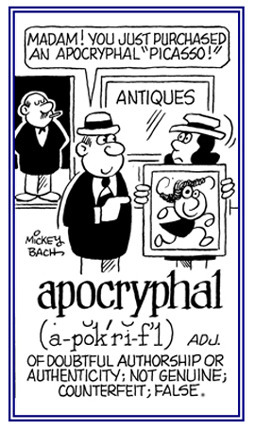
 manumit
manumitPRONUNCIATION:
(man-yuh-MIT)
MEANING:
verb tr.: To free from slavery.
ETYMOLOGY:
From Latin manus (hand) + mittere (to let go). Ultimately from the Indo-European root man- (hand), which also gave us manual, manage, maintain, manicure, maneuver, manufacture, manuscript, command, manure, manque, legerdemain, and mortmain. Earliest documented use: 1455.
USAGE:
"George Washington always intended to manumit those of his slaves who were his own to free (as opposed to the 'dower slaves' from his wife's estate) and he did free them in his will."
First Among Equals; The Economist (London, UK); Oct 21, 2010.
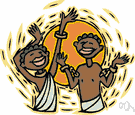
 chiral
chiralPRONUNCIATION:
(KY-ruhl)
MEANING:
adjective: Not superimposable on its mirror image.
ETYMOLOGY:
From Greek cheir (hand). Ultimately from the Indo-European root ghes- (hand), which also gave us cheiromancy/chiromancy (palmistry), surgeon (literally, one who works with hands), and enchiridion (handbook). Earliest documented use: 1894.
USAGE:
"She handed me chopsticks, left hand to left hand. The knot I always had inside me seemed to loosen. Her other-handedness, my true inheritance. Back in Eden's Prairie, it had been an abnormality, an asymmetricality, like a chiral molecule, one that has the same basic structure as others, but doesn't fit in anywhere."
Marie Myung-Ok Lee; Somebody's Daughter; Beacon Press; 2005.

 ABYSMAL
ABYSMAL1. Immeasurably deep, severe, or extreme; fathomless: "The depth of her sorrow was an abysmal situation and, as a result, she could find no expression except to cry."
2. Informal, extremely bad or of very low quality: "The teacher abhorred the abysmal behavior in her class by her students."
Etymology: from the year 1656, formed in English from obsolete abysm, "bottomless gulf, greatest depths"; from Old French abisme, from Vulgar Latin abyssimus.
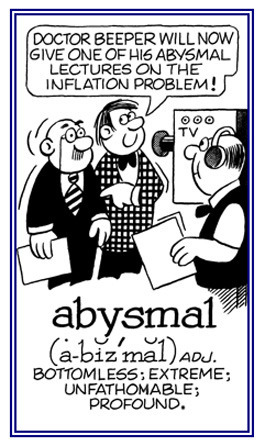
e·qua·nim·i·ty/ˌēkwəˈnimitē/Noun: Mental calmness, composure, and evenness of temper, especially in a difficult situation
 handsel or hansel
handsel or hanselPRONUNCIATION:
(HAN-sel)
MEANING:
noun: 1. A gift for good luck given at the beginning of the new year or a new venture.
2. A first payment or installment.
verb tr.: 1. To give a handsel to.
2. To inaugurate or to do something for the first time.
ETYMOLOGY:
From Old English handselen (giving into hand), from hand + selen (the action of giving, gift). Earliest documented use: 1450.
USAGE:
"Suddenly she thrusts something at him. A small paper packet tied with string. 'A handsel.' she says. 'For Miss Whyte.'"
Joan Thomas; Curiosity; McClelland & Stewart; 2010.
"The School was handselled with two unique archival gifts."
Margaret A. Mackay; Hamish Scott Henderson; Folklore (London, UK); Oct 2002.
 LaLaLa Laura wrote: "e·qua·nim·i·ty/ˌēkwəˈnimitē/Noun: Mental calmness, composure, and evenness of temper, especially in a difficult situation"
LaLaLa Laura wrote: "e·qua·nim·i·ty/ˌēkwəˈnimitē/Noun: Mental calmness, composure, and evenness of temper, especially in a difficult situation"Oh, I wish I had me some equanimity, Laura! My nickname in high school was "Steamboat", and it still fits almost 60 years later! I'm the woman in the cartoon with the exclamation mark over her head and her mouth open :-)
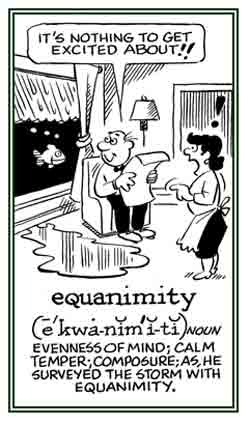
Julia wrote: "LaLaLa Laura wrote: "e·qua·nim·i·ty/ˌēkwəˈnimitē/Noun: Mental calmness, composure, and evenness of temper, especially in a difficult situation"
Oh, I wish I had me some equanimity, Laura! My nick..."
Really Julia?! I would think you'd be the calm in the storm. But you probably worry because you care so much for others...I can see that happening in you.
Oh, I wish I had me some equanimity, Laura! My nick..."
Really Julia?! I would think you'd be the calm in the storm. But you probably worry because you care so much for others...I can see that happening in you.
 mano a mano
mano a manoPRONUNCIATION:
(MA-no a MA-no)
MEANING:
adverb: In direct competition; head-to-head.
adjective: One-on-one; face-to-face.
noun: 1. A bullfight where two matadors compete in turn, fighting several bulls.
2. A direct or face-to-face confrontation.
ETYMOLOGY:
From Spanish mano a mano (hand to hand). Earliest documented use: 1950.
USAGE:
"Today, the editorial board of The Denver Post will go mano a mano with our colleagues at The Seattle Times over which city is better."
It Just Wouldn't Be Fair to Bring These Things Up; Denver Post; Feb 2, 2014.
 ADIAPHOROUS
ADIAPHOROUSsomething that neither benefits nor harms: "A placebo is adiaphorous when it has no medical benefit."
"In a general sense, adiaphorous means neutral, neither right nor wrong, or indifferent."
2. Etymology: from Greek adiaphoros, from the negative prefix a + diaphoros, "different"; that is, "making no difference, of no consequence".
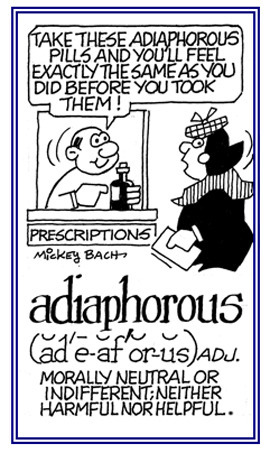
 palmer
palmerPRONUNCIATION:
(PAH-muhr)
MEANING:
noun: 1. A pilgrim.
2. An itinerant monk.
3. One who conceals a card or another object in a magic trick or in cheating in a game.
ETYMOLOGY:
From Latin palma (palm tree, palm of the hand). The name of the palm tree derives from the resemblance of the shape of its frond to the palm of a hand. In Medieval Europe, a pilgrim brought back a palm branch as a token of his pilgrimage. Earliest documented use: 1300. Also see palmy & palmary.
USAGE:
"For the profane palmer the tour might indeed have been little more than a grand debauch, but for a devoted pilgrim like Jefferson it was something more."
Michael Knox Beran; Jefferson's Demons; Free Press; 2003.
Julia wrote: "ADIAPHOROUS
something that neither benefits nor harms: "A placebo is adiaphorous when it has no medical benefit."
"In a general sense, adiaphorous means neutral, neither right nor wrong, or indi..."
I had a supervisor who was Adiaphorous. Speaking to him was like opening a window and nothing happens
something that neither benefits nor harms: "A placebo is adiaphorous when it has no medical benefit."
"In a general sense, adiaphorous means neutral, neither right nor wrong, or indi..."
I had a supervisor who was Adiaphorous. Speaking to him was like opening a window and nothing happens
 Oh my, Laura--that would be so hard! Hope that your verb "had" means this person is no longer in your life!
Oh my, Laura--that would be so hard! Hope that your verb "had" means this person is no longer in your life!
haha. you would be right, Julia about the word Had! but at the time, I just accepted him for what he was.
 AEGIS
AEGIS1. A shield or defensive armor: "The aegis was a mythological shield associated with Zeus and Athena; the aegis of Athena is usually shown with a border of snakes and with the head of Medusa in the center."
2. The power to protect, to support, or to control someone or something "The protection of citizen's rights is under the aegis of the law."
3. Etymology: from Greek aigis, and then from Latin aegis, "the shield of Zeus", said to be made of goatskin, and therefore popularly derived from aig-, the stem of aix-, "goat".
"Zeus, who was the supreme deity of the Greeks, was suckled, when a baby, by a goat named Amalthaea, whose skin was subsequently used to cover the great shield of Zeus. Since this shield was the symbol of the power of the greatest of the gods, a person who acted 'under the aegis' was someone who had the power of the gods supporting him or her."
 LaLaLa Laura wrote: "haha. you would be right, Julia about the word Had! but at the time, I just accepted him for what he was."
LaLaLa Laura wrote: "haha. you would be right, Julia about the word Had! but at the time, I just accepted him for what he was."That's what makes you so special, Laura--you accept all people for what we are :-) Thanks for being you!
Julia wrote: "LaLaLa Laura wrote: "haha. you would be right, Julia about the word Had! but at the time, I just accepted him for what he was."
That's what makes you so special, Laura--you accept all people for ..."
thank you so much for saying that Julia! how sweet. I can see you are a good teacher. you do teach us a lot and you bring out the best in people :)
That's what makes you so special, Laura--you accept all people for ..."
thank you so much for saying that Julia! how sweet. I can see you are a good teacher. you do teach us a lot and you bring out the best in people :)
 ALEATORY
ALEATORY1. Dependent on chance, luck, or an uncertain outcome.
2. Characterized by gambling. "The aleatory results of lotteries makes it impossible to predict who the winners will be."
(from Greek > Latin: "aleato" depending on chance or luck; pertaining to gambling; rolling of dice; game of hazard or chance)
Books mentioned in this topic
The Clicking of Cuthbert (other topics)The Crucible (other topics)
A History of Modern Drama, Volume I (other topics)
Toy Stories: Photos of Children from Around the World and Their Favorite Things (other topics)
The Book of Life (other topics)
More...
Authors mentioned in this topic
Leo Tolstoy (other topics)P.G. Wodehouse (other topics)
Leonardo da Vinci (other topics)
Theodore Roethke (other topics)
David Krasner (other topics)
More...


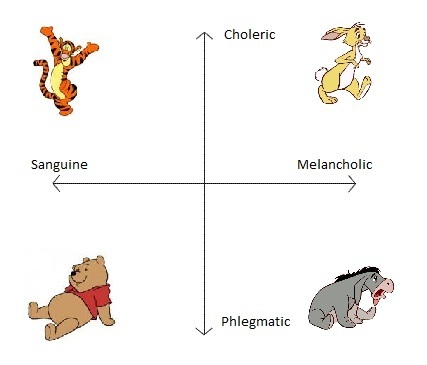

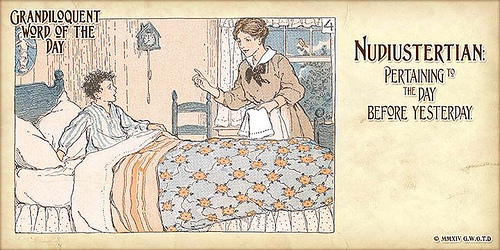
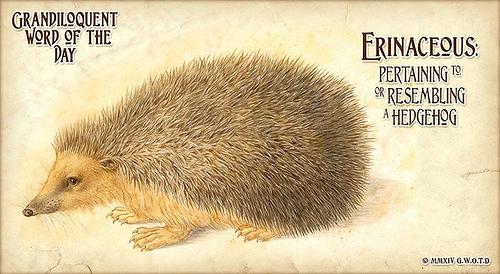
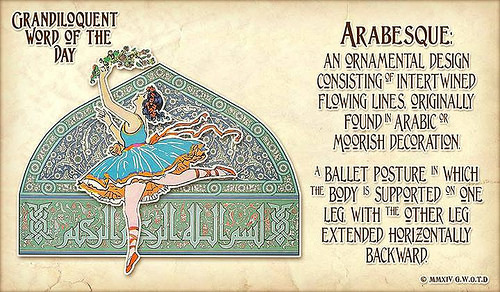


PRONUNCIATION:
(i-SKUCH-uhn)
MEANING:
noun:
1. An ornamental or protective plate surrounding a keyhole, light switch, door handle, etc.
2. Used in the phrase: blot on one's escutcheon (a stain on one's reputation).
3. A shield or shield-shaped surface bearing a coat of arms.
ETYMOLOGY:
From Latin scutum (shield). Earliest documented use: 1480.
USAGE:
"Georgina drew the bolts on the front door and turned the large key in its handsome escutcheon."
Gina Rossi; The Wild Heart; The Wild Rose Press; 2012.
"I've never been arrested. I did get a parking ticket last week, but that's about the only blot on my escutcheon."
Lawrence Block; A Week as Andrea Benstock; Arbor House; 1975.